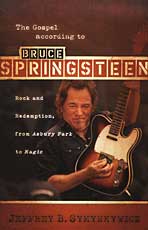"With this fourth album, Springsteen wanted to show the world that he had grown up — and had grown not just older but wiser and more discerning as well. The last vestiges of adolescent bravado that clung to the edges of Born to Run have faded away completely. With Darkness on the Edge of Town, Springsteen found what he himself characterized as his 'adult voice.'
"America was changing, too, by the summer of 1977. The idealism of the 1960s was already a quickly receding memory. Instead, the 1970s had progressed through a messy withdrawal from Vietnam, the national trauma of Watergate, and a severely depressed economy. A new president, Jimmy Carter, had come into office in 1977 amid great plans and high hopes; but he, too, soon seemed overwhelmed by runaway inflation, soaring energy costs, and what came to be characterized as a growing 'malaise' in the national spirit.
"In 'Badlands,' when Springsteen sings 'I want the heart, I want the soul, I want control right now,' he represents all of those who feel themselves at the mercy of impersonal, spirit-crushing forces — all of those who are struggling to assert their personal autonomy and maintain their individual integrity in the face of strong forces of alienation and fragmentation.
"This battle to survive — psychically and emotionally no less than physically and financially — is a constant struggle; indeed, we have to 'live it every day.' Sometimes its costs are unspeakably high and its casualties are numberless. But those costs — even the cost of a broken heart — is 'the price you've gotta pay.' This high cost is the emotional rent that we all are charged if we're to live authentic lives; it's the ownership fee that comes due every single day for the life that is ours to live.
"When we pay this full price on our lives, and meet our obligations, and keep faith with those for whom we are responsible, then the remnant of hope abides, even in the midst of these badlands. Our reward for keeping faith and honoring our responsibilities is the hope that the tide may eventually turn and that a time may come when 'these badlands start treating us good.'
"This is not merely some pie-in-the-sky, impossible dream of the poor man who fantasizes about winning the lottery and striking it rich. It is a much deeper and more genuine hope than that, because it is founded on bedrock values that emerge directly from real life and real relationships. 'I believe in the love . . . in the faith . . . in the hope,' Springsteen sings, as he invokes the three great theological virtues, one after another. It is these three — faith, hope, and love — that abide when all else is taken, as Paul reminds us in I Corinthians 13:13. In our living out of these virtues, we are raised above the muck and mire of these badlands toward a sense of life that is complete and whole.
"When we live our lives honestly and faithfully, we 'spit in the face' of those who deride our human race as hopelessly bound to sin and depravity (which is not to say that sin and depravity don't exist). As 'Badlands' swells to its ultimate affirmation — 'it ain't no sin to be glad you're alive' — we feel once again redeemed, whatever we have been through. We are ready to continue down life's road buoyed by our hard-won hope and with no little joy in our hearts."
Related Content • Read an interview by David Crumm with Jeffrey B. Symynkywicz about Bruce Springsteen's "Ten Suggestions for Spiritual Living"